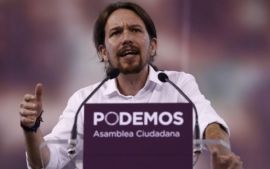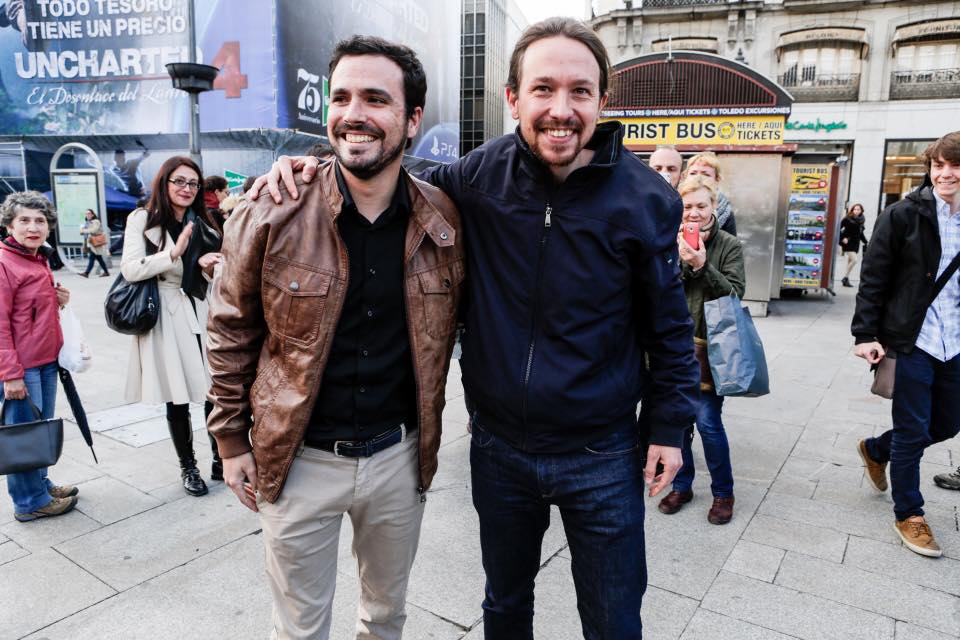The June 26 election campaign in Spain is coming to an end. The coalition between Podemos and United Left seems poised to overtake the Socialist Party, and according to some opinion polls is closing the gap with the ruling right wing Popular Party, which remains in first place. What are the implications and what is the program on which Unidos Podemos stands?
The June 26 election campaign in Spain is coming to an end. The coalition between Podemos and United Left seems poised to overtake the Socialist Party, and according to some opinion polls is closing the gap with the ruling right wing Popular Party, which remains in first place. What are the implications and what is the program on which Unidos Podemos stands?
The calling of early elections in Spain on June 26 was forced because the inconclusive results of the December 20 2015 election did not lead to the formation of a government. At that time the Popular Party (PP) suffered substantial losses, losing a third of its votes and collapsing from 44% of the total vote in 2011 to 28.7%, but still remained the first party. The Socialist Party (PSOE) did not benefit from this and lost 20% of its votes, going down from 28 to 22% of the total vote. The eruption of Podemos and its allied coalitions in Galicia (En Marea – The Rising Tide), Catalonia (En Comú Podem – United We Can) and Valencia (És El Moment – It’s The Time), which received 5 million votes (just over 20%), was notable but not enough to defeat the two party system completely.
The ruling class in Spain and in Europe pushed for the formation of a grand coalition government (in one form or another) involving PP, PSOE and the right populist Ciudadanos (Cs). They need a government with a substantial parliamentary majority that is firmly committed to the continuation of cuts and austerity. However, in this case, the interests of the ruling class did not coincide with the interests of the apparatuses of the different parties, nor the personal interests of their leaders. The PP of Rajoy insisted in being allowed to form government (either with external support or in a coalition). But this is a party which has been extremely discredited, not only by its brutal austerity policies, but also by corruption scandals going right to the top echelons and affecting the party itself as an organisation. For the PSOE and Cs (which demagogically presents itself as the party of anti-corruption and “democratic renewal”), it would have been political suicide to make a formal pact with the PP.
On the other hand the PP was not at all interested in handing power to the PSOE (neither as part of a coalition nor by abstaining). As the party with the most votes, they saw no reason to concede power to anyone else.
Podemos played its cards correctly by making the PSOE an offer it could not accept: a PSOE-Podemos-United Left government, in which Podemos and United Left would hold half of the ministers (which corresponds with the ratio of votes of the different parties involved). The right wing of the PSOE (represented by Andalucia president Susana Diaz) would never allow an agreement with Podemos. The ruling class does not consider them as trustworthy enough to carry out the cuts which are necessary from a capitalist point of view. In the end the PSOE leader, Pedro Sánchez, proposed a four way PSOE-Cs-Podemos-IU coalition. This was an offer designed to fail, as the hardcore right-wing economic policies of Cs could never be reconciled with the program of Podemos nor that of IU.
United We Can
The collapse of these government formation talks is what led to new elections, but the scenario had already changed. First of all, many PSOE voters were now open to the argument that its leaders had rejected the possibility of forming a Left government with Podemos and IU in favour of an agreement with right wing Cs.
Secondly, under enormous pressure from below, Podemos and United Left had reached an electoral agreement, also involving the Catalan, Galician and Valencian left coalitions. The formation of Unidos Podemos (United We Can), as the coalition is known, was not without resistance in both parties. In Podemos, the wing around Íñigo Errejón had always defended the theory that “left” and “right” are no longer relevant political concepts, that what is required now is a “transversal” or cross-sectional approach pitching to “those from below, to those at the top”, which should be “welcoming to all those who want change regardless of their prior political loyalties”. This convoluted theory already suffered a serious blow during the election campaign, when Pablo Iglesias made an appeal to the left vote and particularly appealed to the socialist traditions and symbols of the PSOE voters. The idea of “transversalism” (whatever that might mean) was then completely destroyed by the whole post-election strategy of Podemos, which challenged the PSOE leader to dare form a “left government”. The defeat of Errejón’s thesis was symbolised in the removal of his close ally, Sergio Pascual, as Podemos’ organisation secretary in March.
On the United Left (IU) side, there was also strong resistance on the part of the right wing of the organisation (represented by Llamazares’ Open Left current) against any agreement with Podemos, but also in the “centre” (represented by national coordinator Cayo Lara). The path to an alliance with Podemos was cleared with the victory of Alberto Garzón and the left wing of IU in the internal primary elections in May (where Garzón got 74% of the vote, Cayo Lara’s candidate 20% and Llamazares’ candidate 4%) and then consolidated at the United Left National Assembly (where the vote was split along the same lines) which elected Garzón as the national coordinator of the party to replace Cayo Lara who was standing down.
The formation of this coalition has had a positive impact in largely cutting across an element of sectarianism amongst activists and supporters of both formations which had developed in December during the campaign. There have been a series of very enthusiastic and well attended joint election rallies involving Alberto Garzón and Pablo Iglesias, as well as other leading figures of the allied coalitions. The arithmetic addition of the votes Podemos and IU obtained on December 20 would already put Unidos Podemos, with 6 million votes, ahead of PSOE (which got 5.5 million), but while in December IU and Podemos got a combined total of 71 seats for PSOE’s 90, this time Unidos Podemos would get 10 to 15 seats more, because of the way the Spanish election constituencies work.
On top of this there are other factors which have propelled Unidos Podemos (UP) clearly ahead of PSOE in most opinion polls. First is the multiplying impact of unity between the two forces. Then there is the question of PSOE voters who would want a PSOE-UP coalition government but they are not sure their leaders would allow it and are shifting towards voting for UP. As it becomes clearer that UP is ahead of PSOE, a tactical concentration of the left vote in the best positioned party is emerging. All opinion polls now show UP getting between 24 and 26%, consolidating its lead over PSOE, which hovers around 21%.
These figures don’t tell the whole picture however, as Unidos Podemos is consistently first in the polls amongst the youth (43.6% of the 18 to 34 year old vote), students (35.5%), the unemployed (36.6%), those searching for their first job (37.3%), and those in work (24.2%). About 40% of the Spanish electorate is over 55 and 27% is over 65. These are the layers which most loyally turn out to vote and amongst them there is still a strong degree of loyalty for both PSOE and the PP.
In most of the Unidos Podemos rallies, where there has been a very enthusiastic mood, the main slogan is now “we will beat the PP” (“vamos a ganar al Partido Popular”), as the activists see it as an achievable aim.

Political crisis
The vicious campaign of the mass media and the main parties against Unidos Podemos has lost its edge. Ciudadanos leader Albert Rivera actually started its campaign in Caracas, Venezuela, in an attempt to discredit UP for its links with the “undemocratic regime” of Nicolás Maduro. This has been repeated ad nauseum by the PP and PSOE and echoed by all the main newspapers, right wing and “liberal” alike. It doesn’t stick anymore. If anything it has had the opposite effect. As Unidos Podemos leaders have explained effectively, “they talk about Venezuela, because they have a lot to hide in Spain”.
The Popular Party is forecasted to get a result similar or perhaps marginally better than on December 20, getting 28 to 30% of the vote.
Such a result would lead, again, to deadlock in parliament, but with certain differences. First of all, Unidos Podemos is likely to overtake the PSOE not only in votes but also in number of seats, with the former getting between 85 to 95 for the latter’s 73 to 85. Such a result, giving the combined forces of UP and PSOE either an overall majority of seats or very close to that, would put the PSOE leadership under enormous pressure to form a coalition with UP, which has centered its campaign around offering such an option.
However, such a coalition is extremely unlikely. The PSOE leaders are firm representatives of the interests of the ruling class. The ruling class needs to continue to implement a brutal program of budget cuts. Spain has already gone over its agreed deficit reduction target. In order to soften the blow, the European Union has kindly agreed with Rajoy a delay in discussing a fine on Spain for breaking the budget deficit limit until after the election. The European Commission has made it abundantly clear that it expects any government in Spain to implement a package of between 8 and 10bn euro worth of cuts this year. Clearly, a UP-PSOE government in which the PSOE would be the junior partner is not a guarantee of stability from the point of view of the capitalists. This would be different and much more unstable than the government agreement in Portugal, where the PS is the main actor with external support from the PCP and Bloco.
At the same time, if PSOE rejects a coalition offer from UP (the ground for which is already being prepared by its leaders), that would seriously damage the party, particularly because it would lead, in one form or another, to a government with the presence of the hated PP. It would clearly create enormous internal turmoil in PSOE and the acceleration of the process of its Pasokification.
The ruling class is already exerting enormous pressure towards the formation of a grand coalition between PP-PSOE and Cs. The Spanish media are full of reports of “alarm in Brussels and NATO” about the “possibility of a populist government”. This is being used to put additional pressure towards the formation of a grand coalition of austerity.
The potential instability of a Brexit vote in today’s referendum is used as an additional argument. “The best answer to the uncertainty it could generate is a government of PP, PSOE and Cs” said today the acting Finance Minister De Guindos.
There are several variants of how such a government would be formed. If the results are seen as bad for the PSOE, then Pedro Sanchez could be removed, opening the way to a government of the PP with external support from PSOE, or even a formal coalition on the basis of a limited program. Clearly, this is what Rajoy is counting on. If the results are seen as bad for PP (which at the moment is less likely), then Rajoy might be removed opening the way for some sort of agreement with a Pedro Sánchez led PSOE. Cs has already said that a 3-way agreement is its prefered option and in any case its seats are not really crucial in any of the combinations.
Whatever the final combination, a government of cuts and austerity with Unidos Podemos being the official opposition would only prepare its rise to power at a later date. It could also provoke a return of mass mobilisations in the streets, which have ebbed in the last two years.
Which way forward?
 In this context, it is worth analysing the program of Unidos Podemos. There has been a constant trend towards watering it down ever since Podemos was set up in January 2014. The current program is slightly more moderate than the one Podemos stood on in December. Still, it contains a number of important commitments on concrete policies, like the repeal of many of the reactionary laws introduced by the PP in fields like democratic rights, labour rights, education, etc. as well as a commitment to public spending in health care, education and so on. All of these measures are positive and we support them enthusiastically.
In this context, it is worth analysing the program of Unidos Podemos. There has been a constant trend towards watering it down ever since Podemos was set up in January 2014. The current program is slightly more moderate than the one Podemos stood on in December. Still, it contains a number of important commitments on concrete policies, like the repeal of many of the reactionary laws introduced by the PP in fields like democratic rights, labour rights, education, etc. as well as a commitment to public spending in health care, education and so on. All of these measures are positive and we support them enthusiastically.
The main problem comes when we look at the core of the program – that is, where will the money come in order to implement it. Pablo Iglesias has explained clearly what he wants: a new Social Democracy. This is the thesis he has been putting forward consistently in the last few months, including in a speech to employers in Barcelona (For a New Social Democracy) and in an opinion article in Público (A Fourth Social Democracy?).
What does this consist of, for Iglesias? To quote: “A fourth social democracy, understood as the possibility of redistributive policies within the framework of the market economy, ensuring social protection and fiscal justice as engines of economic development based on domestic demand as an engine of transformation of the productive and industrial model and as promoter of social and sovereignist Europeanism, I think this is the best choice for Spain.”
The concrete proposals he advances are: “to re-negotiate with Brussels the rhythm of deficit reduction, by postponing to the end of parliament the achievement of the 3% target”, “a plan of fighting tax evasion”, “a progressive reform of the tax system”, and “a package of measures against tax havens”.
There are several problems with this. The main one is that whilst social democratic policies were possible in the long postwar boom, on the basis of sustained growth of capitalism, this is no longer the case. We live in a period of capitalist crisis with sluggish rates of growth at best. There is no possibility of implementing “redistributive policies” in the current context. And European capital (chiefly German capital) will not allow it.
We need to look no further than Greece and France to see this in practice. Precisely a year ago, the Greek government of Syriza, elected on a program which was basically the same Unidos Podemos is advancing now, was brutally forced to capitulate. Any idea of renegotiating the deficit reduction targets with the Troika was smashed to pieces by brute force. Pablo Iglesias and the other leaders of Podemos argue that Spain is not Greece and that being a stronger economy would give them more leverage at the negotiating table. It is true that Spain is not tied to a formal bailout program, but nevertherless, the Troika has powerful tools to intervene in the Spanish economy (by causing panic in the markets, massive withdrawal of capital, a sudden jump in the yields of Spanish debt, etc) which would force any government operating “within the framework of the market economy” to its knees.
In France, the program on which Hollande was elected was precisely one of stimulating the economy, taxing the rich and investing in public services. In a few months this was all reversed. The attempt to tax the rich led to them literally fleeing the country. A massive package of cuts was implemented and now a draconian pro-bosses labour counter-reform is being fought on the streets. Hollande’s popularity ratings are now in the low 10s.
A Unidos Podemos government, now or later on, would be faced with exactly the same pressures to implement a policy of cuts and austerity. The only way to implement the progressive reforms included in its program would be to break with capitalism, to put the interests of working people before the interests of bankers and capitalists. This is the main lesson from Greece, one which the leaders of Unidos Podemos attempt to avoid.
Whilst we fight with all our strength for an electoral victory of Unidos Podemos, which would represent a massive blow for the ruling class in Spain and a serious defeat for its main parties, we have the duty to warn about the limitations of its program. Spanish workers and youth, who are putting their hopes for fundamental change in Unidos Podemos, will have to go through a steep learning curve.
Marxists will accompany them, shoulder by shoulder, and help them understand that the only way to fundamentally change society – to put an end to poverty, unemployment, evictions, cuts in health care and education, the forced emigration of our youth, and many other symptoms of the crisis of capitalism – is to decisively confront the power of the small unelected and unaccountable minority of bankers and capitalists, in Spain, throughout Europe, and across the whole world.






